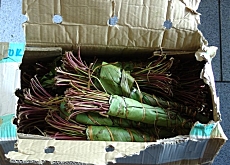
Khat gives border guards plenty to chew on

Border guards in Geneva fear a sizeable market is developing for the illegal drug, khat, following three big seizures in the past two months.
Officers in western Switzerland have intercepted over 450 kilograms of the natural stimulant so far this year – more than twice the amount seized in the region during all of 2004.
Last year the authorities seized 1,235kg of khat across the country, mainly at Zurich and Geneva airports, and at the French and German borders.
“The phenomenon has been increasing over the past four or five years,” said Andrea Canonica, spokesman for the Federal Customs Office.
“It’s related to the fact that we have more and more people coming [to Switzerland] from countries where the drug is traditionally used. But from the point of view of public health we are not that concerned.”
In the latest bust on June 1, border guards seized 156kg of khat after stopping a car on the outskirts of Geneva.
The driver, a Dutch national who is banned from Switzerland, was found to be transporting 20 boxes of the plant.
“It is our fifth seizure this year, and what’s surprising us is the amount we’re seeing. In the past two months alone we have seized more than 400 kilos,” said staff officer Michel Bachar, who is based at border-guard headquarters in Geneva.
In each of the recent seizures, the khat came from the Netherlands and was packed in boxes bearing the name “Zeynab MK”. The drug is believed to have been shipped from Africa to a Dutch port, prior to being driven to Switzerland.
Bachar stressed that while the recent busts had all taken place in western Switzerland, the problem was not confined to that part of the country. Those apprehended had links with Basel, Geneva and Lucerne.
Psychoactive ingredients
Khat or catha edulis, which contains the psychoactive ingredients cathinone and cathine, is grown across East Africa and southern Arabia where it has been used for centuries. Chewing the fresh leaves produces effects similar to amphetamine.
“Your energy levels rise, you feel more awake and it also suppresses appetite. After this euphoric effect there is a second phase when you become quite tired and some people even become depressed or quite anxious,” said Janine Messerli, spokeswoman for the Institute for the Prevention of Alcohol and Drug Addiction.
“There is a risk of psychological addiction and if you consume it regularly the membrane of the mouth can become infected. In very rare cases there are psychotic symptoms like paranoia.”
The institute says khat is classed by the European Parliament as a “soft to middle-hard” drug and banned in many countries.
Worrying development
One worrying development, according to Bachar, was the discovery at Geneva airport earlier this year of 14kg of dried khat. Analysis revealed that the dried form of the drug, which had not been seen before, contained five times as much cathine as fresh khat.
Bachar said this raised the question whether there was a move to increase the strength of the drug in order to tap into new markets.
“We have to ask ourselves whether we are seeing an evolution in the consumption of this plant which can have a hallucinogenic effect and is therefore dangerous,” he told swissinfo.
“What concerns me – and this is a personal view – is that after the [nationwide] crackdown on cannabis it is possible people are turning towards another drug.”
But Messerli says the institute, which does not consider khat a big issue, has seen no evidence to indicate that the drug is destined for anyone other than the country’s African and Arab communities.
“As far as we know it’s mostly immigrants. We don’t have any information about young people or any other groups consuming khat,” she said.
Jumping to conclusions
The institute also cautions that the recent seizures should not be viewed as proof that a market for the drug is developing in Switzerland.
It says research would need to be carried out to draw an accurate picture of khat consumption across the country. Messerli suggested that the recent busts could just be a “coincidence” and the result of effective policing.
But Bachar is unconvinced. Working on the basis that border guards catch only five to ten per cent of illicit goods entering the country, he believes the recent seizures are just the tip of the iceberg.
And he doesn’t subscribe to the view that khat poses little danger to Swiss society.
“For us the position is very simple. Apart from Britain and the Netherlands, other European countries consider this drug dangerous because it provokes effects that can render a person uncontrollable,” he said.
“There is also the preventive aspect. If you go on the internet and look up cathine, you’ll see that it’s hardly fruit juice.”
swissinfo, Adam Beaumont
Major khat seizures in western Switzerland in 2005:
April 6: 128kg
May 24: 160kg
June 1: 156kg
1,235kg of the drug were seized in Switzerland in 2004.

In compliance with the JTI standards
More: SWI swissinfo.ch certified by the Journalism Trust Initiative
















![The four-metre-long painting "Sonntag der Bergbauern" [Sunday of the Mountain Farmers, 1923-24/26] had to be removed by a crane from the German Chancellery in Berlin for the exhibition in Bern.](https://www.swissinfo.ch/content/wp-content/uploads/sites/13/2025/12/01_Pressebild_KirchnerxKirchner.jpg?ver=cb688ed5)














You can find an overview of ongoing debates with our journalists here . Please join us!
If you want to start a conversation about a topic raised in this article or want to report factual errors, email us at english@swissinfo.ch.